Contemporary Hospitality Industry
VerifiedAdded on 2023/01/11
|9
|2812
|23
AI Summary
This report explores various kinds of business organisations in the hospitality industry and the range of products and services offered by them. It also examines the operational and functional departments within a selected hospitality business and discusses the contribution of the hospitality industry to the local, national, and international economy. Additionally, it explores different operational roles within the industry and the necessary skills for these roles, as well as the current shortage in skills.
Contribute Materials
Your contribution can guide someone’s learning journey. Share your
documents today.
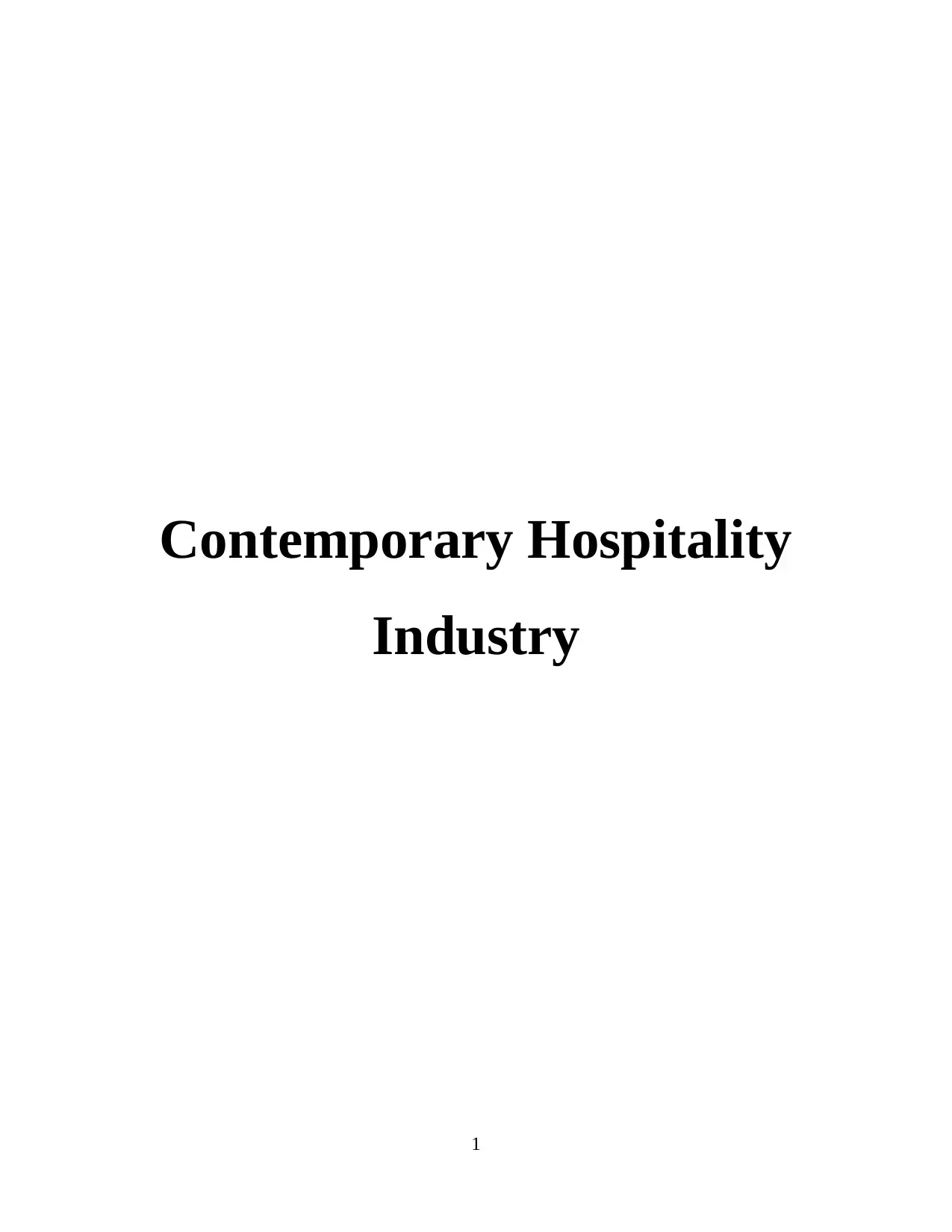
Contemporary Hospitality
Industry
1
Industry
1
Secure Best Marks with AI Grader
Need help grading? Try our AI Grader for instant feedback on your assignments.
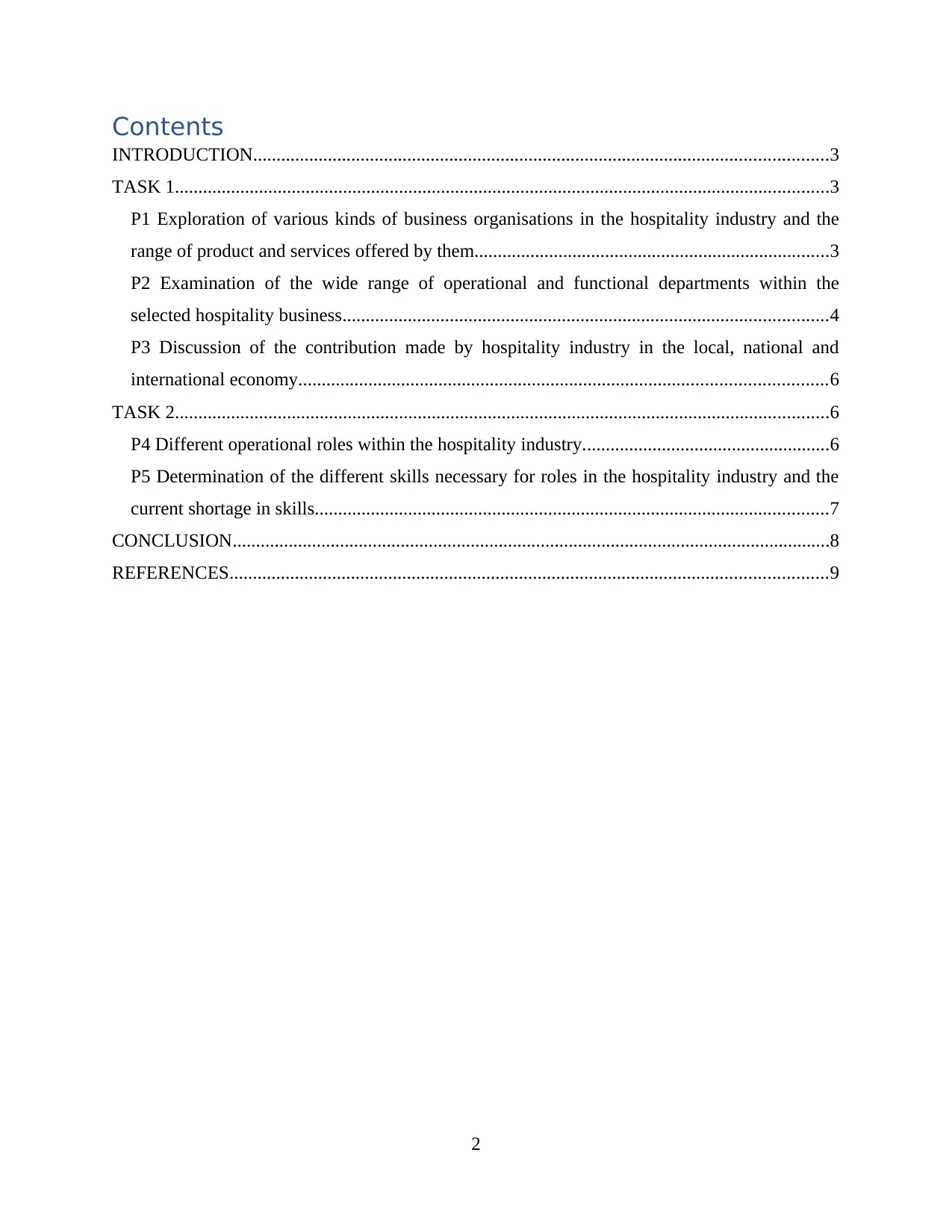
Contents
INTRODUCTION...........................................................................................................................3
TASK 1............................................................................................................................................3
P1 Exploration of various kinds of business organisations in the hospitality industry and the
range of product and services offered by them............................................................................3
P2 Examination of the wide range of operational and functional departments within the
selected hospitality business........................................................................................................4
P3 Discussion of the contribution made by hospitality industry in the local, national and
international economy.................................................................................................................6
TASK 2............................................................................................................................................6
P4 Different operational roles within the hospitality industry.....................................................6
P5 Determination of the different skills necessary for roles in the hospitality industry and the
current shortage in skills..............................................................................................................7
CONCLUSION................................................................................................................................8
REFERENCES................................................................................................................................9
2
INTRODUCTION...........................................................................................................................3
TASK 1............................................................................................................................................3
P1 Exploration of various kinds of business organisations in the hospitality industry and the
range of product and services offered by them............................................................................3
P2 Examination of the wide range of operational and functional departments within the
selected hospitality business........................................................................................................4
P3 Discussion of the contribution made by hospitality industry in the local, national and
international economy.................................................................................................................6
TASK 2............................................................................................................................................6
P4 Different operational roles within the hospitality industry.....................................................6
P5 Determination of the different skills necessary for roles in the hospitality industry and the
current shortage in skills..............................................................................................................7
CONCLUSION................................................................................................................................8
REFERENCES................................................................................................................................9
2
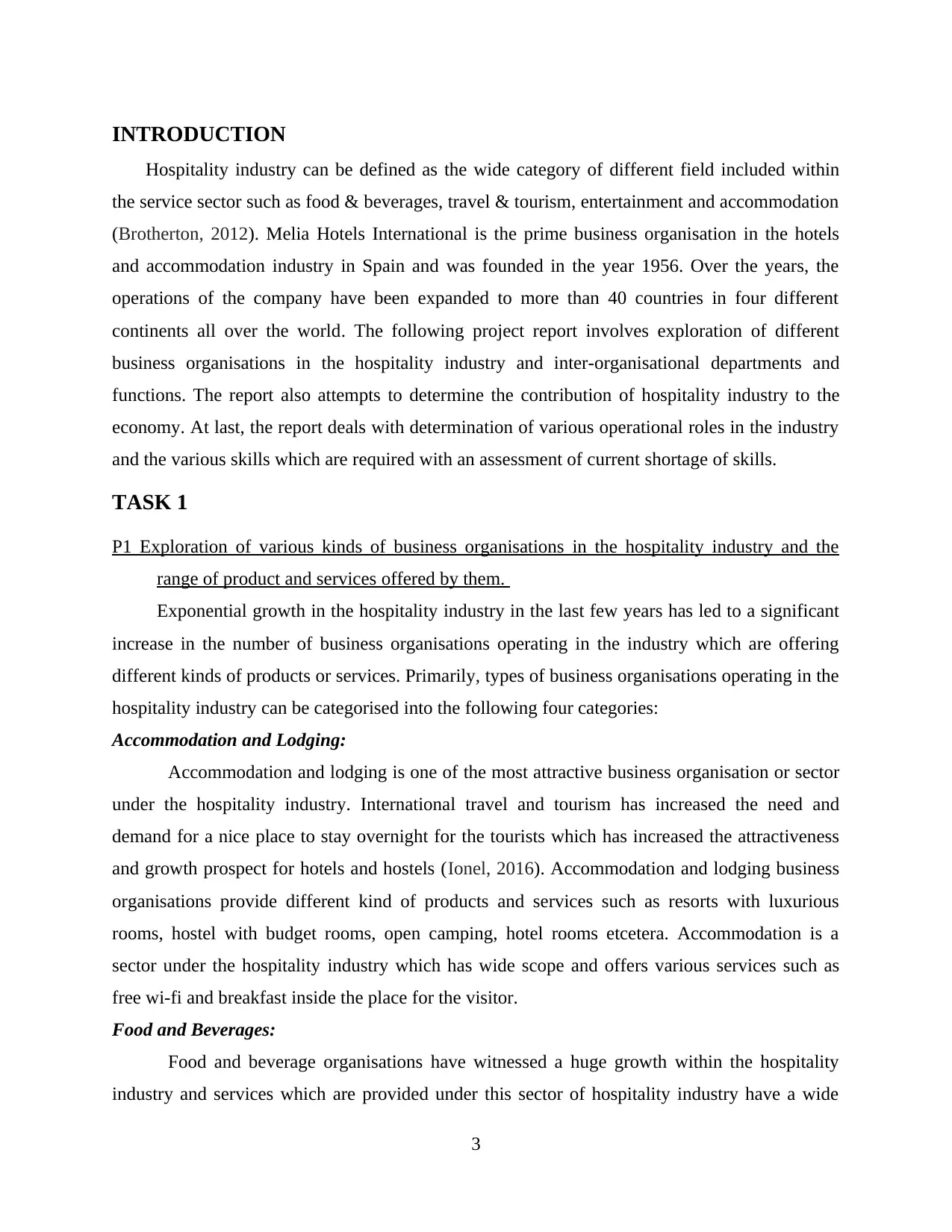
INTRODUCTION
Hospitality industry can be defined as the wide category of different field included within
the service sector such as food & beverages, travel & tourism, entertainment and accommodation
(Brotherton, 2012). Melia Hotels International is the prime business organisation in the hotels
and accommodation industry in Spain and was founded in the year 1956. Over the years, the
operations of the company have been expanded to more than 40 countries in four different
continents all over the world. The following project report involves exploration of different
business organisations in the hospitality industry and inter-organisational departments and
functions. The report also attempts to determine the contribution of hospitality industry to the
economy. At last, the report deals with determination of various operational roles in the industry
and the various skills which are required with an assessment of current shortage of skills.
TASK 1
P1 Exploration of various kinds of business organisations in the hospitality industry and the
range of product and services offered by them.
Exponential growth in the hospitality industry in the last few years has led to a significant
increase in the number of business organisations operating in the industry which are offering
different kinds of products or services. Primarily, types of business organisations operating in the
hospitality industry can be categorised into the following four categories:
Accommodation and Lodging:
Accommodation and lodging is one of the most attractive business organisation or sector
under the hospitality industry. International travel and tourism has increased the need and
demand for a nice place to stay overnight for the tourists which has increased the attractiveness
and growth prospect for hotels and hostels (Ionel, 2016). Accommodation and lodging business
organisations provide different kind of products and services such as resorts with luxurious
rooms, hostel with budget rooms, open camping, hotel rooms etcetera. Accommodation is a
sector under the hospitality industry which has wide scope and offers various services such as
free wi-fi and breakfast inside the place for the visitor.
Food and Beverages:
Food and beverage organisations have witnessed a huge growth within the hospitality
industry and services which are provided under this sector of hospitality industry have a wide
3
Hospitality industry can be defined as the wide category of different field included within
the service sector such as food & beverages, travel & tourism, entertainment and accommodation
(Brotherton, 2012). Melia Hotels International is the prime business organisation in the hotels
and accommodation industry in Spain and was founded in the year 1956. Over the years, the
operations of the company have been expanded to more than 40 countries in four different
continents all over the world. The following project report involves exploration of different
business organisations in the hospitality industry and inter-organisational departments and
functions. The report also attempts to determine the contribution of hospitality industry to the
economy. At last, the report deals with determination of various operational roles in the industry
and the various skills which are required with an assessment of current shortage of skills.
TASK 1
P1 Exploration of various kinds of business organisations in the hospitality industry and the
range of product and services offered by them.
Exponential growth in the hospitality industry in the last few years has led to a significant
increase in the number of business organisations operating in the industry which are offering
different kinds of products or services. Primarily, types of business organisations operating in the
hospitality industry can be categorised into the following four categories:
Accommodation and Lodging:
Accommodation and lodging is one of the most attractive business organisation or sector
under the hospitality industry. International travel and tourism has increased the need and
demand for a nice place to stay overnight for the tourists which has increased the attractiveness
and growth prospect for hotels and hostels (Ionel, 2016). Accommodation and lodging business
organisations provide different kind of products and services such as resorts with luxurious
rooms, hostel with budget rooms, open camping, hotel rooms etcetera. Accommodation is a
sector under the hospitality industry which has wide scope and offers various services such as
free wi-fi and breakfast inside the place for the visitor.
Food and Beverages:
Food and beverage organisations have witnessed a huge growth within the hospitality
industry and services which are provided under this sector of hospitality industry have a wide
3
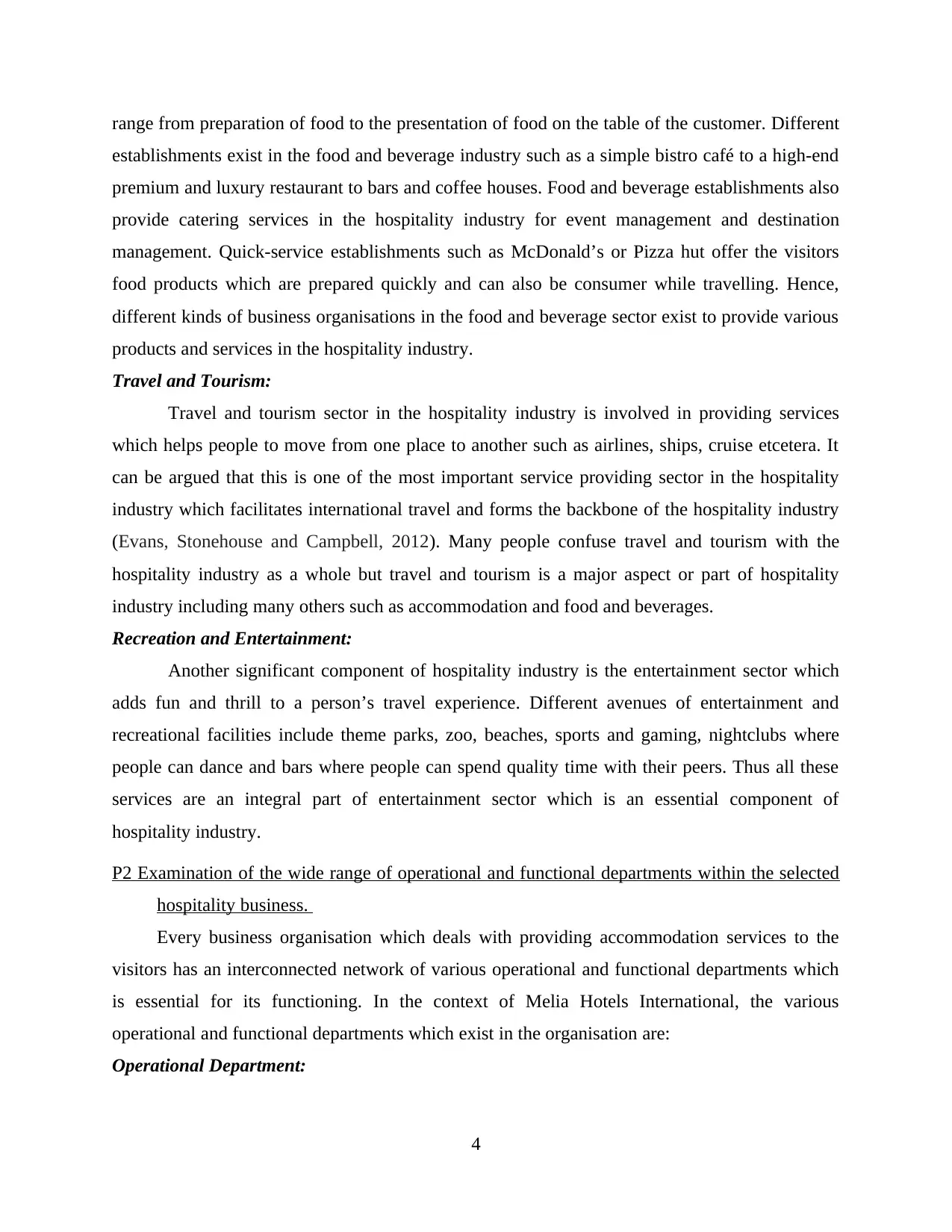
range from preparation of food to the presentation of food on the table of the customer. Different
establishments exist in the food and beverage industry such as a simple bistro café to a high-end
premium and luxury restaurant to bars and coffee houses. Food and beverage establishments also
provide catering services in the hospitality industry for event management and destination
management. Quick-service establishments such as McDonald’s or Pizza hut offer the visitors
food products which are prepared quickly and can also be consumer while travelling. Hence,
different kinds of business organisations in the food and beverage sector exist to provide various
products and services in the hospitality industry.
Travel and Tourism:
Travel and tourism sector in the hospitality industry is involved in providing services
which helps people to move from one place to another such as airlines, ships, cruise etcetera. It
can be argued that this is one of the most important service providing sector in the hospitality
industry which facilitates international travel and forms the backbone of the hospitality industry
(Evans, Stonehouse and Campbell, 2012). Many people confuse travel and tourism with the
hospitality industry as a whole but travel and tourism is a major aspect or part of hospitality
industry including many others such as accommodation and food and beverages.
Recreation and Entertainment:
Another significant component of hospitality industry is the entertainment sector which
adds fun and thrill to a person’s travel experience. Different avenues of entertainment and
recreational facilities include theme parks, zoo, beaches, sports and gaming, nightclubs where
people can dance and bars where people can spend quality time with their peers. Thus all these
services are an integral part of entertainment sector which is an essential component of
hospitality industry.
P2 Examination of the wide range of operational and functional departments within the selected
hospitality business.
Every business organisation which deals with providing accommodation services to the
visitors has an interconnected network of various operational and functional departments which
is essential for its functioning. In the context of Melia Hotels International, the various
operational and functional departments which exist in the organisation are:
Operational Department:
4
establishments exist in the food and beverage industry such as a simple bistro café to a high-end
premium and luxury restaurant to bars and coffee houses. Food and beverage establishments also
provide catering services in the hospitality industry for event management and destination
management. Quick-service establishments such as McDonald’s or Pizza hut offer the visitors
food products which are prepared quickly and can also be consumer while travelling. Hence,
different kinds of business organisations in the food and beverage sector exist to provide various
products and services in the hospitality industry.
Travel and Tourism:
Travel and tourism sector in the hospitality industry is involved in providing services
which helps people to move from one place to another such as airlines, ships, cruise etcetera. It
can be argued that this is one of the most important service providing sector in the hospitality
industry which facilitates international travel and forms the backbone of the hospitality industry
(Evans, Stonehouse and Campbell, 2012). Many people confuse travel and tourism with the
hospitality industry as a whole but travel and tourism is a major aspect or part of hospitality
industry including many others such as accommodation and food and beverages.
Recreation and Entertainment:
Another significant component of hospitality industry is the entertainment sector which
adds fun and thrill to a person’s travel experience. Different avenues of entertainment and
recreational facilities include theme parks, zoo, beaches, sports and gaming, nightclubs where
people can dance and bars where people can spend quality time with their peers. Thus all these
services are an integral part of entertainment sector which is an essential component of
hospitality industry.
P2 Examination of the wide range of operational and functional departments within the selected
hospitality business.
Every business organisation which deals with providing accommodation services to the
visitors has an interconnected network of various operational and functional departments which
is essential for its functioning. In the context of Melia Hotels International, the various
operational and functional departments which exist in the organisation are:
Operational Department:
4
Secure Best Marks with AI Grader
Need help grading? Try our AI Grader for instant feedback on your assignments.
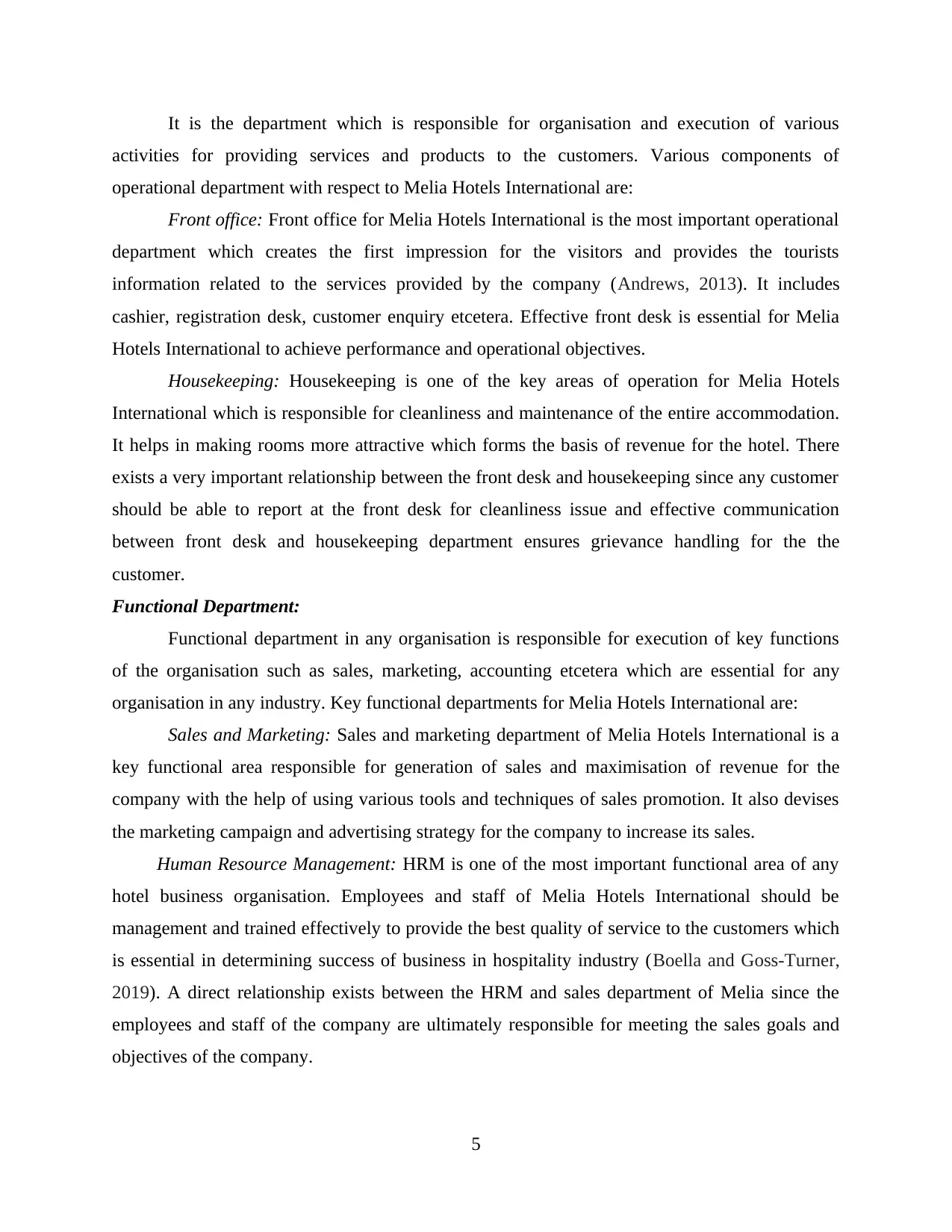
It is the department which is responsible for organisation and execution of various
activities for providing services and products to the customers. Various components of
operational department with respect to Melia Hotels International are:
Front office: Front office for Melia Hotels International is the most important operational
department which creates the first impression for the visitors and provides the tourists
information related to the services provided by the company (Andrews, 2013). It includes
cashier, registration desk, customer enquiry etcetera. Effective front desk is essential for Melia
Hotels International to achieve performance and operational objectives.
Housekeeping: Housekeeping is one of the key areas of operation for Melia Hotels
International which is responsible for cleanliness and maintenance of the entire accommodation.
It helps in making rooms more attractive which forms the basis of revenue for the hotel. There
exists a very important relationship between the front desk and housekeeping since any customer
should be able to report at the front desk for cleanliness issue and effective communication
between front desk and housekeeping department ensures grievance handling for the the
customer.
Functional Department:
Functional department in any organisation is responsible for execution of key functions
of the organisation such as sales, marketing, accounting etcetera which are essential for any
organisation in any industry. Key functional departments for Melia Hotels International are:
Sales and Marketing: Sales and marketing department of Melia Hotels International is a
key functional area responsible for generation of sales and maximisation of revenue for the
company with the help of using various tools and techniques of sales promotion. It also devises
the marketing campaign and advertising strategy for the company to increase its sales.
Human Resource Management: HRM is one of the most important functional area of any
hotel business organisation. Employees and staff of Melia Hotels International should be
management and trained effectively to provide the best quality of service to the customers which
is essential in determining success of business in hospitality industry (Boella and Goss-Turner,
2019). A direct relationship exists between the HRM and sales department of Melia since the
employees and staff of the company are ultimately responsible for meeting the sales goals and
objectives of the company.
5
activities for providing services and products to the customers. Various components of
operational department with respect to Melia Hotels International are:
Front office: Front office for Melia Hotels International is the most important operational
department which creates the first impression for the visitors and provides the tourists
information related to the services provided by the company (Andrews, 2013). It includes
cashier, registration desk, customer enquiry etcetera. Effective front desk is essential for Melia
Hotels International to achieve performance and operational objectives.
Housekeeping: Housekeeping is one of the key areas of operation for Melia Hotels
International which is responsible for cleanliness and maintenance of the entire accommodation.
It helps in making rooms more attractive which forms the basis of revenue for the hotel. There
exists a very important relationship between the front desk and housekeeping since any customer
should be able to report at the front desk for cleanliness issue and effective communication
between front desk and housekeeping department ensures grievance handling for the the
customer.
Functional Department:
Functional department in any organisation is responsible for execution of key functions
of the organisation such as sales, marketing, accounting etcetera which are essential for any
organisation in any industry. Key functional departments for Melia Hotels International are:
Sales and Marketing: Sales and marketing department of Melia Hotels International is a
key functional area responsible for generation of sales and maximisation of revenue for the
company with the help of using various tools and techniques of sales promotion. It also devises
the marketing campaign and advertising strategy for the company to increase its sales.
Human Resource Management: HRM is one of the most important functional area of any
hotel business organisation. Employees and staff of Melia Hotels International should be
management and trained effectively to provide the best quality of service to the customers which
is essential in determining success of business in hospitality industry (Boella and Goss-Turner,
2019). A direct relationship exists between the HRM and sales department of Melia since the
employees and staff of the company are ultimately responsible for meeting the sales goals and
objectives of the company.
5
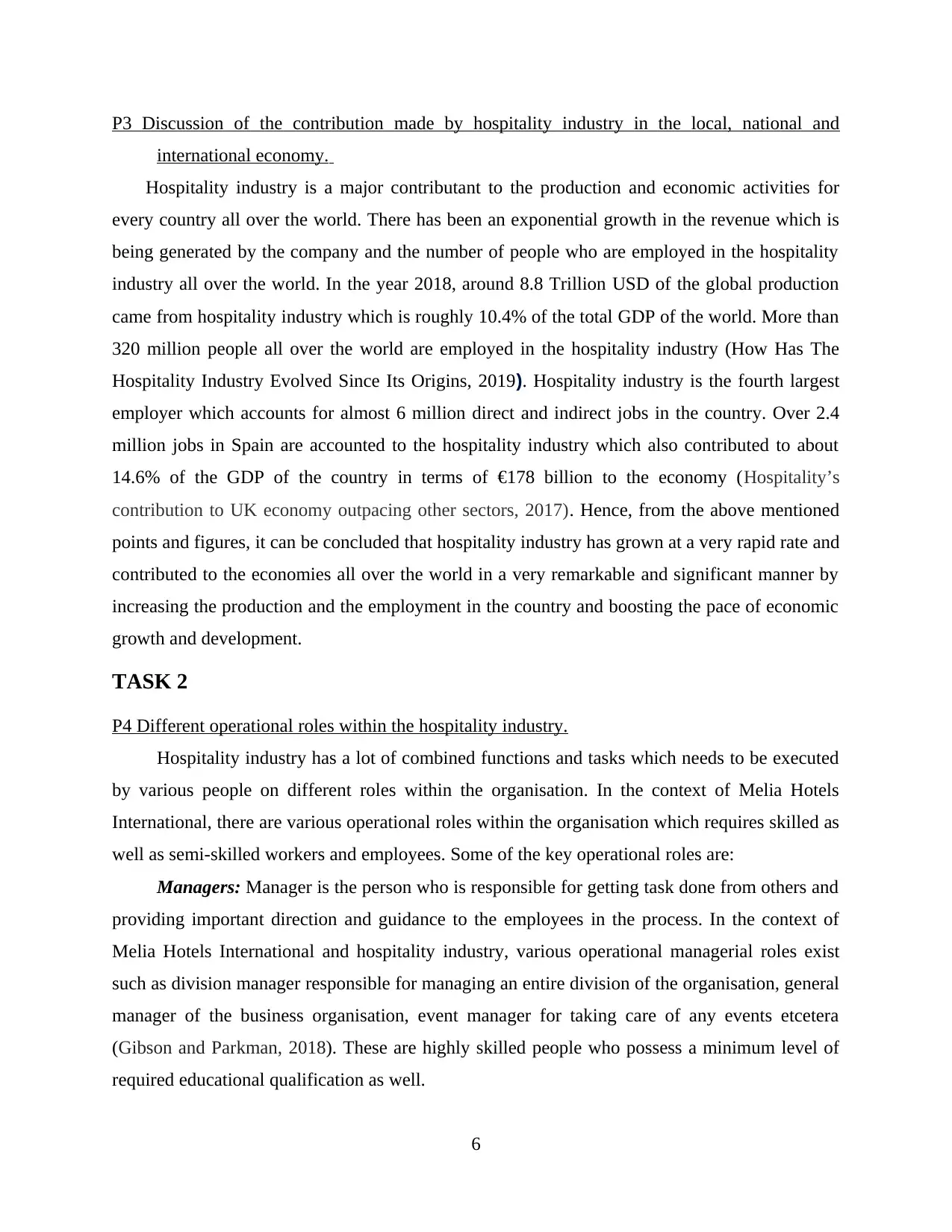
P3 Discussion of the contribution made by hospitality industry in the local, national and
international economy.
Hospitality industry is a major contributant to the production and economic activities for
every country all over the world. There has been an exponential growth in the revenue which is
being generated by the company and the number of people who are employed in the hospitality
industry all over the world. In the year 2018, around 8.8 Trillion USD of the global production
came from hospitality industry which is roughly 10.4% of the total GDP of the world. More than
320 million people all over the world are employed in the hospitality industry (How Has The
Hospitality Industry Evolved Since Its Origins, 2019). Hospitality industry is the fourth largest
employer which accounts for almost 6 million direct and indirect jobs in the country. Over 2.4
million jobs in Spain are accounted to the hospitality industry which also contributed to about
14.6% of the GDP of the country in terms of €178 billion to the economy (Hospitality’s
contribution to UK economy outpacing other sectors, 2017). Hence, from the above mentioned
points and figures, it can be concluded that hospitality industry has grown at a very rapid rate and
contributed to the economies all over the world in a very remarkable and significant manner by
increasing the production and the employment in the country and boosting the pace of economic
growth and development.
TASK 2
P4 Different operational roles within the hospitality industry.
Hospitality industry has a lot of combined functions and tasks which needs to be executed
by various people on different roles within the organisation. In the context of Melia Hotels
International, there are various operational roles within the organisation which requires skilled as
well as semi-skilled workers and employees. Some of the key operational roles are:
Managers: Manager is the person who is responsible for getting task done from others and
providing important direction and guidance to the employees in the process. In the context of
Melia Hotels International and hospitality industry, various operational managerial roles exist
such as division manager responsible for managing an entire division of the organisation, general
manager of the business organisation, event manager for taking care of any events etcetera
(Gibson and Parkman, 2018). These are highly skilled people who possess a minimum level of
required educational qualification as well.
6
international economy.
Hospitality industry is a major contributant to the production and economic activities for
every country all over the world. There has been an exponential growth in the revenue which is
being generated by the company and the number of people who are employed in the hospitality
industry all over the world. In the year 2018, around 8.8 Trillion USD of the global production
came from hospitality industry which is roughly 10.4% of the total GDP of the world. More than
320 million people all over the world are employed in the hospitality industry (How Has The
Hospitality Industry Evolved Since Its Origins, 2019). Hospitality industry is the fourth largest
employer which accounts for almost 6 million direct and indirect jobs in the country. Over 2.4
million jobs in Spain are accounted to the hospitality industry which also contributed to about
14.6% of the GDP of the country in terms of €178 billion to the economy (Hospitality’s
contribution to UK economy outpacing other sectors, 2017). Hence, from the above mentioned
points and figures, it can be concluded that hospitality industry has grown at a very rapid rate and
contributed to the economies all over the world in a very remarkable and significant manner by
increasing the production and the employment in the country and boosting the pace of economic
growth and development.
TASK 2
P4 Different operational roles within the hospitality industry.
Hospitality industry has a lot of combined functions and tasks which needs to be executed
by various people on different roles within the organisation. In the context of Melia Hotels
International, there are various operational roles within the organisation which requires skilled as
well as semi-skilled workers and employees. Some of the key operational roles are:
Managers: Manager is the person who is responsible for getting task done from others and
providing important direction and guidance to the employees in the process. In the context of
Melia Hotels International and hospitality industry, various operational managerial roles exist
such as division manager responsible for managing an entire division of the organisation, general
manager of the business organisation, event manager for taking care of any events etcetera
(Gibson and Parkman, 2018). These are highly skilled people who possess a minimum level of
required educational qualification as well.
6
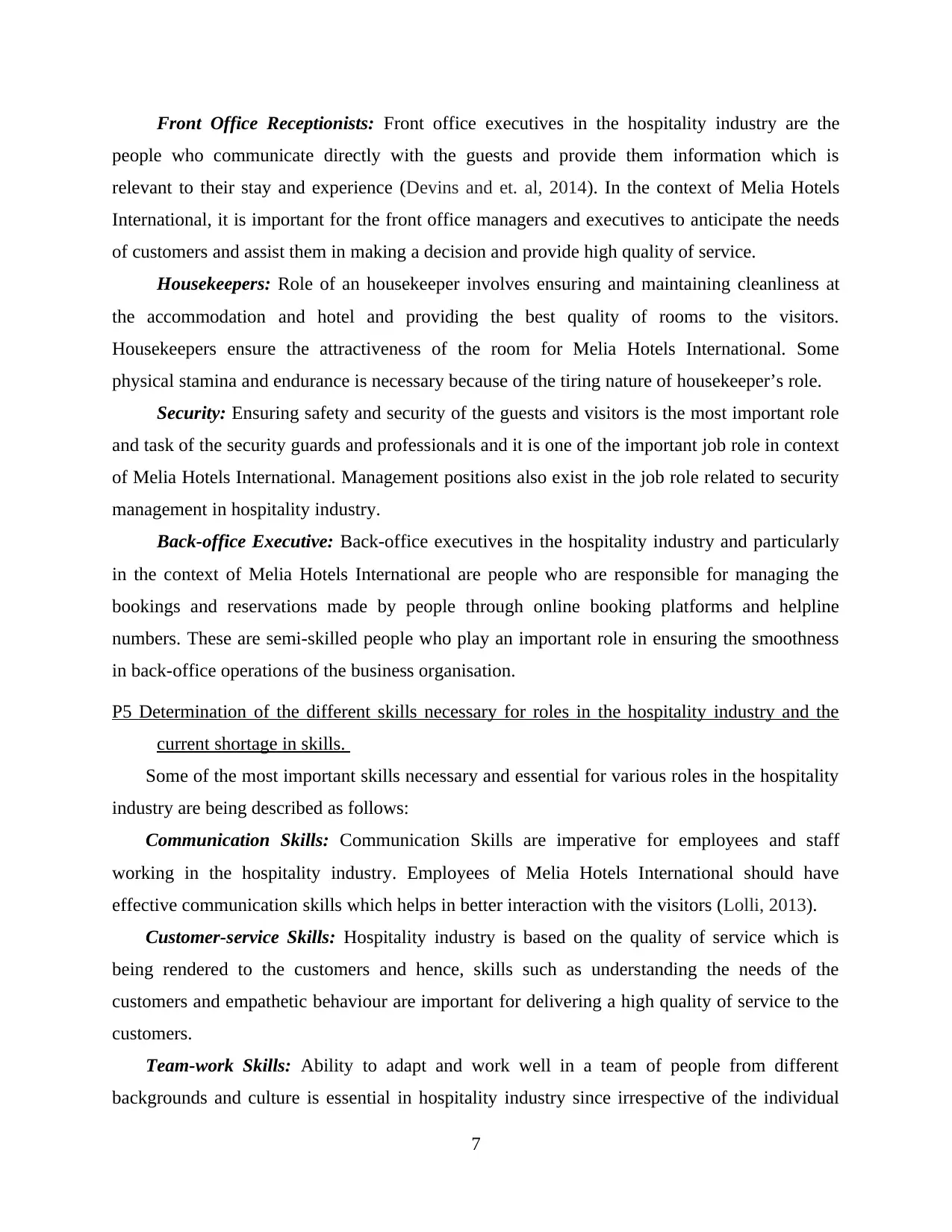
Front Office Receptionists: Front office executives in the hospitality industry are the
people who communicate directly with the guests and provide them information which is
relevant to their stay and experience (Devins and et. al, 2014). In the context of Melia Hotels
International, it is important for the front office managers and executives to anticipate the needs
of customers and assist them in making a decision and provide high quality of service.
Housekeepers: Role of an housekeeper involves ensuring and maintaining cleanliness at
the accommodation and hotel and providing the best quality of rooms to the visitors.
Housekeepers ensure the attractiveness of the room for Melia Hotels International. Some
physical stamina and endurance is necessary because of the tiring nature of housekeeper’s role.
Security: Ensuring safety and security of the guests and visitors is the most important role
and task of the security guards and professionals and it is one of the important job role in context
of Melia Hotels International. Management positions also exist in the job role related to security
management in hospitality industry.
Back-office Executive: Back-office executives in the hospitality industry and particularly
in the context of Melia Hotels International are people who are responsible for managing the
bookings and reservations made by people through online booking platforms and helpline
numbers. These are semi-skilled people who play an important role in ensuring the smoothness
in back-office operations of the business organisation.
P5 Determination of the different skills necessary for roles in the hospitality industry and the
current shortage in skills.
Some of the most important skills necessary and essential for various roles in the hospitality
industry are being described as follows:
Communication Skills: Communication Skills are imperative for employees and staff
working in the hospitality industry. Employees of Melia Hotels International should have
effective communication skills which helps in better interaction with the visitors (Lolli, 2013).
Customer-service Skills: Hospitality industry is based on the quality of service which is
being rendered to the customers and hence, skills such as understanding the needs of the
customers and empathetic behaviour are important for delivering a high quality of service to the
customers.
Team-work Skills: Ability to adapt and work well in a team of people from different
backgrounds and culture is essential in hospitality industry since irrespective of the individual
7
people who communicate directly with the guests and provide them information which is
relevant to their stay and experience (Devins and et. al, 2014). In the context of Melia Hotels
International, it is important for the front office managers and executives to anticipate the needs
of customers and assist them in making a decision and provide high quality of service.
Housekeepers: Role of an housekeeper involves ensuring and maintaining cleanliness at
the accommodation and hotel and providing the best quality of rooms to the visitors.
Housekeepers ensure the attractiveness of the room for Melia Hotels International. Some
physical stamina and endurance is necessary because of the tiring nature of housekeeper’s role.
Security: Ensuring safety and security of the guests and visitors is the most important role
and task of the security guards and professionals and it is one of the important job role in context
of Melia Hotels International. Management positions also exist in the job role related to security
management in hospitality industry.
Back-office Executive: Back-office executives in the hospitality industry and particularly
in the context of Melia Hotels International are people who are responsible for managing the
bookings and reservations made by people through online booking platforms and helpline
numbers. These are semi-skilled people who play an important role in ensuring the smoothness
in back-office operations of the business organisation.
P5 Determination of the different skills necessary for roles in the hospitality industry and the
current shortage in skills.
Some of the most important skills necessary and essential for various roles in the hospitality
industry are being described as follows:
Communication Skills: Communication Skills are imperative for employees and staff
working in the hospitality industry. Employees of Melia Hotels International should have
effective communication skills which helps in better interaction with the visitors (Lolli, 2013).
Customer-service Skills: Hospitality industry is based on the quality of service which is
being rendered to the customers and hence, skills such as understanding the needs of the
customers and empathetic behaviour are important for delivering a high quality of service to the
customers.
Team-work Skills: Ability to adapt and work well in a team of people from different
backgrounds and culture is essential in hospitality industry since irrespective of the individual
7
Paraphrase This Document
Need a fresh take? Get an instant paraphrase of this document with our AI Paraphraser
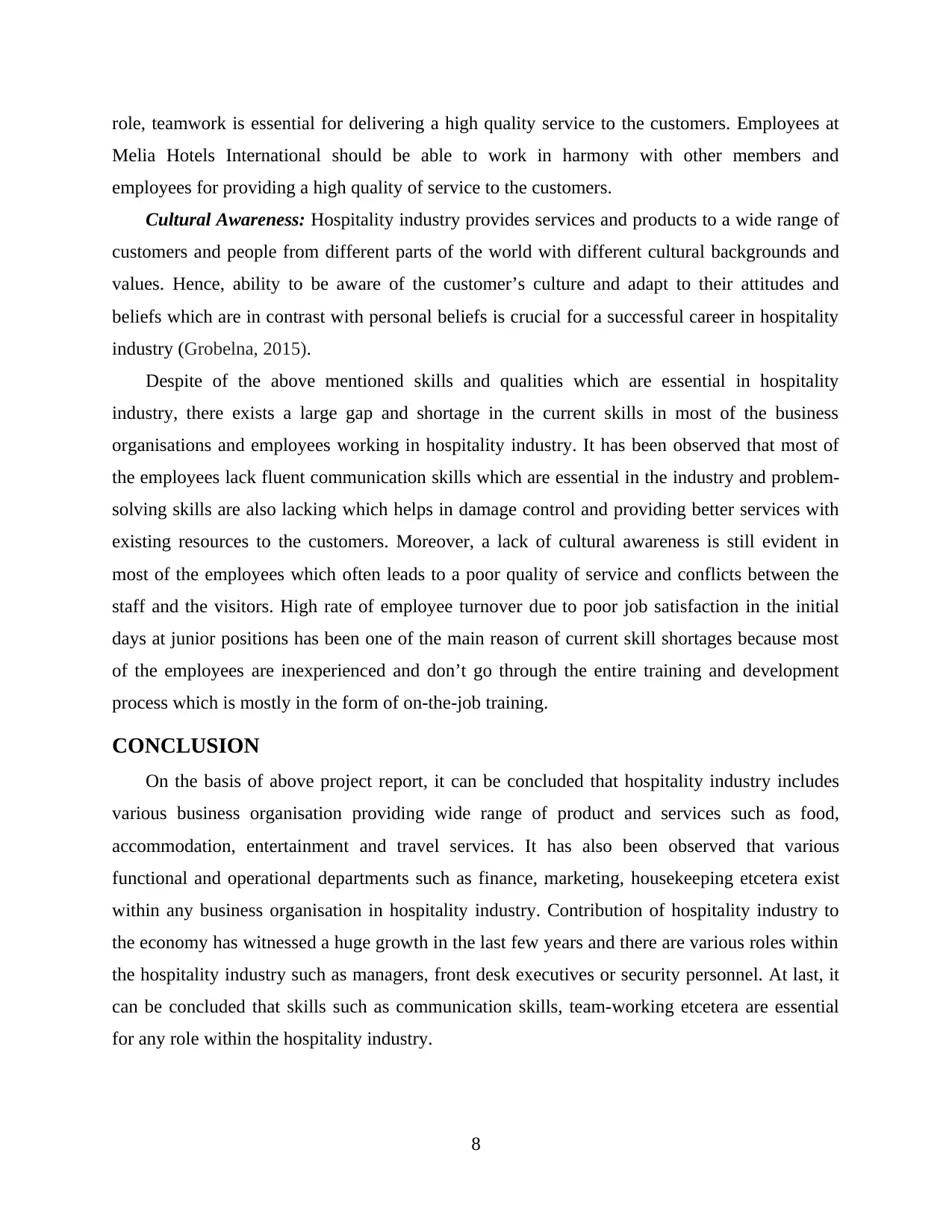
role, teamwork is essential for delivering a high quality service to the customers. Employees at
Melia Hotels International should be able to work in harmony with other members and
employees for providing a high quality of service to the customers.
Cultural Awareness: Hospitality industry provides services and products to a wide range of
customers and people from different parts of the world with different cultural backgrounds and
values. Hence, ability to be aware of the customer’s culture and adapt to their attitudes and
beliefs which are in contrast with personal beliefs is crucial for a successful career in hospitality
industry (Grobelna, 2015).
Despite of the above mentioned skills and qualities which are essential in hospitality
industry, there exists a large gap and shortage in the current skills in most of the business
organisations and employees working in hospitality industry. It has been observed that most of
the employees lack fluent communication skills which are essential in the industry and problem-
solving skills are also lacking which helps in damage control and providing better services with
existing resources to the customers. Moreover, a lack of cultural awareness is still evident in
most of the employees which often leads to a poor quality of service and conflicts between the
staff and the visitors. High rate of employee turnover due to poor job satisfaction in the initial
days at junior positions has been one of the main reason of current skill shortages because most
of the employees are inexperienced and don’t go through the entire training and development
process which is mostly in the form of on-the-job training.
CONCLUSION
On the basis of above project report, it can be concluded that hospitality industry includes
various business organisation providing wide range of product and services such as food,
accommodation, entertainment and travel services. It has also been observed that various
functional and operational departments such as finance, marketing, housekeeping etcetera exist
within any business organisation in hospitality industry. Contribution of hospitality industry to
the economy has witnessed a huge growth in the last few years and there are various roles within
the hospitality industry such as managers, front desk executives or security personnel. At last, it
can be concluded that skills such as communication skills, team-working etcetera are essential
for any role within the hospitality industry.
8
Melia Hotels International should be able to work in harmony with other members and
employees for providing a high quality of service to the customers.
Cultural Awareness: Hospitality industry provides services and products to a wide range of
customers and people from different parts of the world with different cultural backgrounds and
values. Hence, ability to be aware of the customer’s culture and adapt to their attitudes and
beliefs which are in contrast with personal beliefs is crucial for a successful career in hospitality
industry (Grobelna, 2015).
Despite of the above mentioned skills and qualities which are essential in hospitality
industry, there exists a large gap and shortage in the current skills in most of the business
organisations and employees working in hospitality industry. It has been observed that most of
the employees lack fluent communication skills which are essential in the industry and problem-
solving skills are also lacking which helps in damage control and providing better services with
existing resources to the customers. Moreover, a lack of cultural awareness is still evident in
most of the employees which often leads to a poor quality of service and conflicts between the
staff and the visitors. High rate of employee turnover due to poor job satisfaction in the initial
days at junior positions has been one of the main reason of current skill shortages because most
of the employees are inexperienced and don’t go through the entire training and development
process which is mostly in the form of on-the-job training.
CONCLUSION
On the basis of above project report, it can be concluded that hospitality industry includes
various business organisation providing wide range of product and services such as food,
accommodation, entertainment and travel services. It has also been observed that various
functional and operational departments such as finance, marketing, housekeeping etcetera exist
within any business organisation in hospitality industry. Contribution of hospitality industry to
the economy has witnessed a huge growth in the last few years and there are various roles within
the hospitality industry such as managers, front desk executives or security personnel. At last, it
can be concluded that skills such as communication skills, team-working etcetera are essential
for any role within the hospitality industry.
8
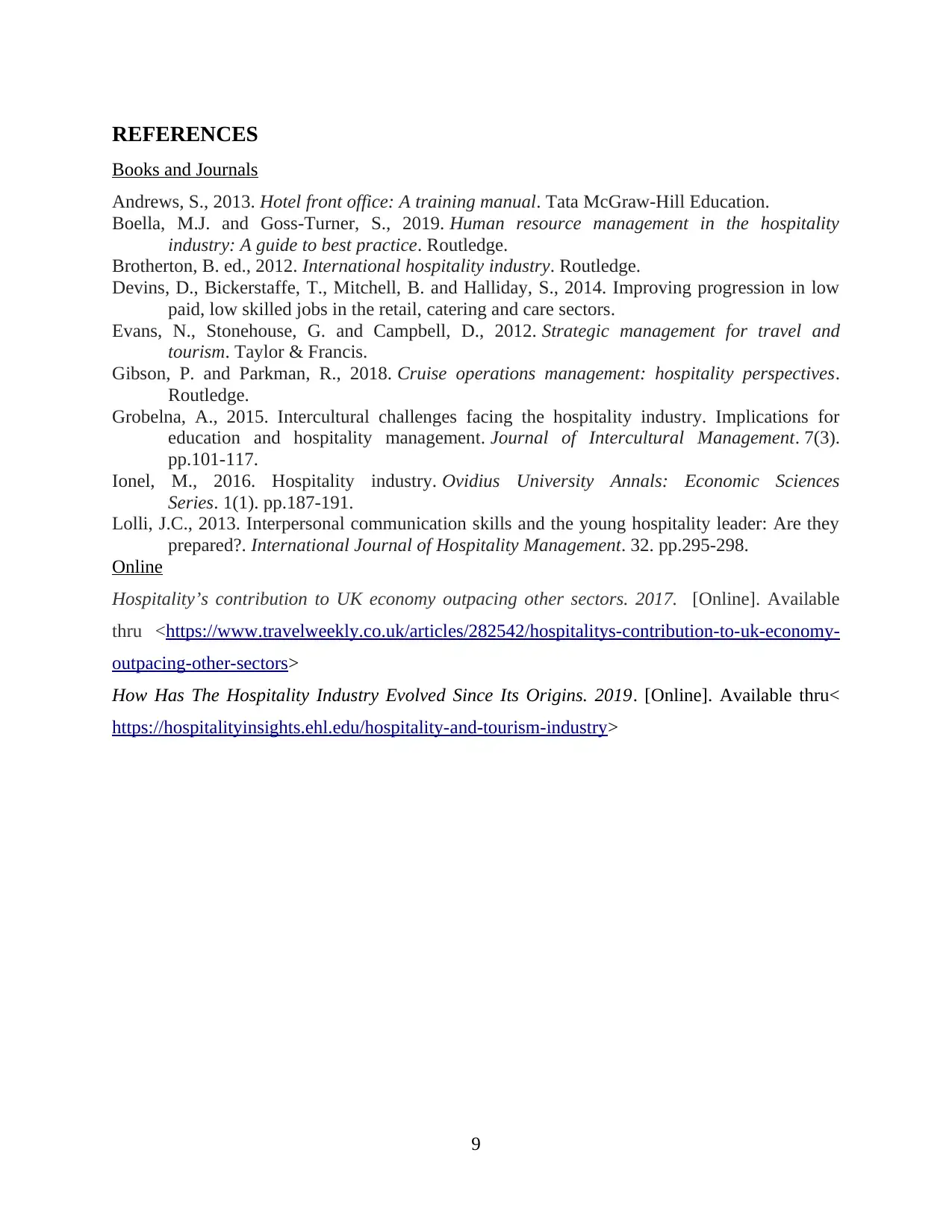
REFERENCES
Books and Journals
Andrews, S., 2013. Hotel front office: A training manual. Tata McGraw-Hill Education.
Boella, M.J. and Goss-Turner, S., 2019. Human resource management in the hospitality
industry: A guide to best practice. Routledge.
Brotherton, B. ed., 2012. International hospitality industry. Routledge.
Devins, D., Bickerstaffe, T., Mitchell, B. and Halliday, S., 2014. Improving progression in low
paid, low skilled jobs in the retail, catering and care sectors.
Evans, N., Stonehouse, G. and Campbell, D., 2012. Strategic management for travel and
tourism. Taylor & Francis.
Gibson, P. and Parkman, R., 2018. Cruise operations management: hospitality perspectives.
Routledge.
Grobelna, A., 2015. Intercultural challenges facing the hospitality industry. Implications for
education and hospitality management. Journal of Intercultural Management. 7(3).
pp.101-117.
Ionel, M., 2016. Hospitality industry. Ovidius University Annals: Economic Sciences
Series. 1(1). pp.187-191.
Lolli, J.C., 2013. Interpersonal communication skills and the young hospitality leader: Are they
prepared?. International Journal of Hospitality Management. 32. pp.295-298.
Online
Hospitality’s contribution to UK economy outpacing other sectors. 2017. [Online]. Available
thru <https://www.travelweekly.co.uk/articles/282542/hospitalitys-contribution-to-uk-economy-
outpacing-other-sectors>
How Has The Hospitality Industry Evolved Since Its Origins. 2019. [Online]. Available thru<
https://hospitalityinsights.ehl.edu/hospitality-and-tourism-industry>
9
Books and Journals
Andrews, S., 2013. Hotel front office: A training manual. Tata McGraw-Hill Education.
Boella, M.J. and Goss-Turner, S., 2019. Human resource management in the hospitality
industry: A guide to best practice. Routledge.
Brotherton, B. ed., 2012. International hospitality industry. Routledge.
Devins, D., Bickerstaffe, T., Mitchell, B. and Halliday, S., 2014. Improving progression in low
paid, low skilled jobs in the retail, catering and care sectors.
Evans, N., Stonehouse, G. and Campbell, D., 2012. Strategic management for travel and
tourism. Taylor & Francis.
Gibson, P. and Parkman, R., 2018. Cruise operations management: hospitality perspectives.
Routledge.
Grobelna, A., 2015. Intercultural challenges facing the hospitality industry. Implications for
education and hospitality management. Journal of Intercultural Management. 7(3).
pp.101-117.
Ionel, M., 2016. Hospitality industry. Ovidius University Annals: Economic Sciences
Series. 1(1). pp.187-191.
Lolli, J.C., 2013. Interpersonal communication skills and the young hospitality leader: Are they
prepared?. International Journal of Hospitality Management. 32. pp.295-298.
Online
Hospitality’s contribution to UK economy outpacing other sectors. 2017. [Online]. Available
thru <https://www.travelweekly.co.uk/articles/282542/hospitalitys-contribution-to-uk-economy-
outpacing-other-sectors>
How Has The Hospitality Industry Evolved Since Its Origins. 2019. [Online]. Available thru<
https://hospitalityinsights.ehl.edu/hospitality-and-tourism-industry>
9
1 out of 9
Related Documents
Your All-in-One AI-Powered Toolkit for Academic Success.
+13062052269
info@desklib.com
Available 24*7 on WhatsApp / Email
![[object Object]](/_next/static/media/star-bottom.7253800d.svg)
Unlock your academic potential
© 2024 | Zucol Services PVT LTD | All rights reserved.




